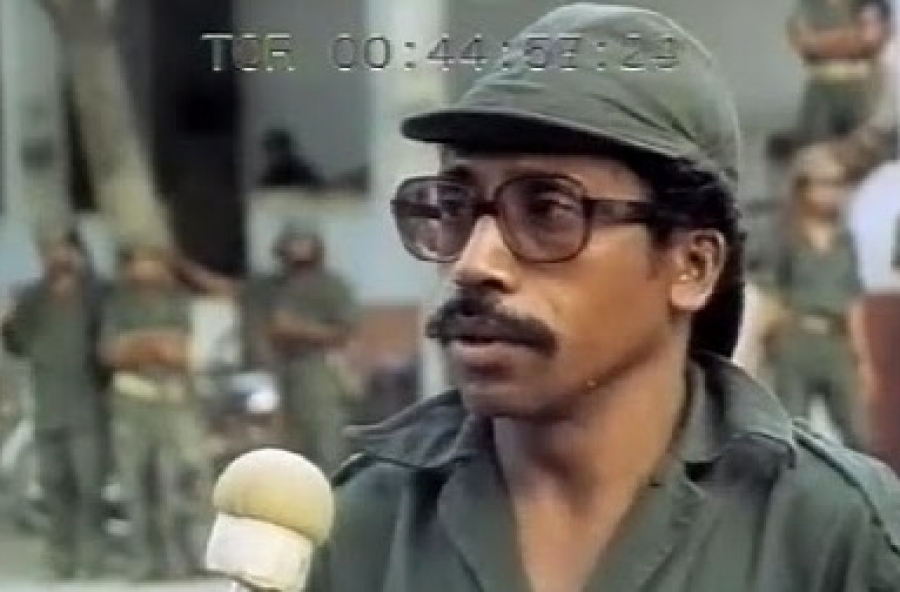Abe Barreto Soares’ Poetry for Nation Building
Written by SARA MOREIRA
As a blogger since 2007, Abe (or his cyber-pseudonym, Jenuvem Eurito, as he was called by his friends in his youth) shares his words and thoughts in four languages often analysing literary work relevant for the self determination of his country. Moreover, Abe discusses thoroughly the construction of a national conscience after the fight for independence.
Taking advantage of the benefits of blogs to foster global connections and distance conversations in original ways, he describes his blogs as “sweet words, caring words, in a venue for people to talk to each other, sharing with each other on “what” and “how” life goes in the world”.
But Abe's words and actions have not always been this free, as he stated during the Indonesian occupation of Timorese territory.
Global Voices Online (GVO): Where were you 10 years ago? Can you tell us a bit about your life?
Abe Barreto Soares (ABS): During the time of the referendum, I was overseas. I happened to be in Portugal at the time. Along with other Timorese compatriots, I cast my vote in Lisbon.
I left Timor-Leste in 1985 to pursue my university studies, taking English as my major at Gadjah Mada University, Yogyakarta, Indonesia. Then, I left for Canada to take part in a cultural exchange program in early September 1991. On November 12 1991 the [Santa Cruz] massacre occurred when I was about to finish my program. Being concerned for my personal safety if I was to return to Indonesia, I finally decided to stay in Canada, and seek political asylum. I spent 7 years in Canada, campaigning for a free and independent Timor-Leste through diplomacy and cultural activities (using music as a tool to alert the outside world to what was really going on in the country). I had the chance to spend a year and a half in Portugal from Spring 1998 until the Fall of 1999. Then, I went to Macau for journalistic training with a Portuguese news agency, Lusa, for six months (October 1999 until March 2000). I returned to Timor-Leste in July 2000. Since then, I have been working in UN missions in Timor-Leste both as an information assistant and a translator/ interpreter.
GVO: How did you have access to Timorese literature during the Indonesian times?
ABS: During the Indonesian times, while doing my studies in Yogyakarta, I came across books on Timor-Leste such as “EasTimor: Nationalism and Colonialism” by Jill Jollife, a fellow journalist, from Australia. From this book I discovered the late Timorese poet, Francisco Borja da Costa. One of the lines of his poetry appearing in the book: “smother my revolts/ with the point of your bayonet/ torture my body/in the chains of your empire/ subjugate my soul/ in the faith of your religion…/” really fired the sense of nationalism within me. And through the book “Funu: The Unfinished Saga of East Timor” by José Ramos-Horta (current President of the Republic of Timor-Leste) I discovered Fernando Sylvan.
GVO: You often quote Timorese poet Fernando Sylvan. In what ways do you take advantage of poetry in order not to shut up, as he recommends in the above poem?
ABS: A poet is a spokesperson of his or her era. He or she should break the silence when it comes to oppression. Living on this planet, we are in a constant battle between the dark and the light. A poet should be at the forefront, carrying the torch. He or she is the “warrior of the light”. (I borrow this concept from Paulo Coelho, the Brazilian writer).
GVO: Do your blogs in four different languages reflect the way people communicate in Timor?
ABS: Timorese like me have to be creative in taking advantage of the ‘blessing’ of colonialism and globalization. Aside from using my own mother tongue, Tetum and my father’s mother tongue, Galole which I am good at, I also use English and Indonesian in my literary carrier. I am proud of using them to communicate what I think and feel. I would love, someday soon, to create a Portuguese blog as well.
GVO: Why have you created a Korespondensia Literaria (Literary Correspondence, tet) category on one of your blogs?
ABS: I created the “korrespondensia literaria” entry on my Tetum blog in an attempt to convey to the outside readers the correspondence I have had with my fellow literary friends through SMS. Practically speaking, transferring them onto a blog can be considered as a way to save those messages. As a man of letters I need to engage in a constant communication with friends the world over. I want to learn a lot from them. I want to commune the philosophy of Greenpeace, “think globally, and act locally”.
Blogs by Abe Barreto Soares: Dadolin-Poetry from the Land of Lafaek-Crocodile: A Space for Poetic Mind and Poetic Feeling. In English, Tetum, Bahasa Indonesia and Galole.
This post is the second of a series to commemorate the 10th anniversary of the popular referendum in East Timor, which led to the territory's internationally recognized independence. In the first post we highlighted the support of the international community for the freedom of East Timor. In this post, we interview Abe Barreto Soares who is one of the organizers of the celebration events for solidarity taking place in East Timor in August and September 2009.
Source - Website: Global Voice Online (http://globalvoicesonline.org/). Title: East Timor: Abe Barreto Soares’ Poetry for Nation Building (http://globalvoicesonline.org/2009/08/28/east-timor-abe-barreto-soares-poetry-for-nation-building/). Posted: 28 August 2009. Written by Sara Moreira (http://www.saritamoreira.com)















Sem comentários:
Enviar um comentário